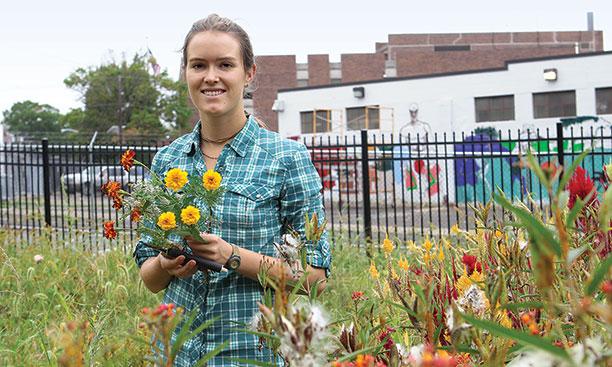
Some of Allegra Lovejoy ’14’s fondest childhood memories are of trips to the Grand Army Plaza Greenmarket in Brooklyn, N.Y. Twenty years later, Lovejoy finds herself on the other side of the farm stand as the manager at Capital City Farm, an urban farm in Trenton, N.J.
Located less than a mile from the highway (Route 1) in East Trenton — one of the city’s most blighted neighborhoods — Capital City Farm was an overgrown lot before community activists heard about plans to turn it into a junkyard for vehicles. The activists contacted D&R Greenway Land Trust — an organization dedicated to preserving natural areas in New Jersey — which, with other local groups, raised funds to officially preserve the property as an open space. In late 2015, Lovejoy joined D&R as a project fellow and a farm-and-volunteer coordinator to help ready the lot for agriculture and chart its future. The following spring, she was promoted to manager, responsible for transforming the neglected property into a functioning 2-acre farm.
Lovejoy was no stranger to farming, thanks to her foray into community gardening the year before with The Food Project in Boston. That job introduced her to all aspects of farm management and even required her to design and build an irrigation system.
“There are [so] many challenging aspects to farming, including site planning; water engineering; and fertility, pest and disease, and labor management,” Lovejoy says. “I had to learn all of those on the job. It made for a challenging year.”
At Capital City Farm, Lovejoy has made community involvement a priority. She and her staff of two set up shop at farmers markets in Trenton twice a week during the summer and donate about half of the farm’s produce to a nearby food pantry and to the Trenton Area Soup Kitchen. The farm also sells its harvest to local restaurants.
“We’ve chosen to keep the food in the city as a part of our mission,” Lovejoy says. “We’re not here trying to take resources from Trenton. We want to keep it all here.”
“We grow food in solidarity and support of the low-income communities that surround us and are open to any means to get that food into their kitchens.”
— Allegra Lovejoy ’14
After two growing seasons, the former abandoned lot has been completely transformed. In the summer, an acre of wildflowers bursting with zinnias, Queen Anne’s lace, and black-eyed Susans can be seen by passersby on the farm’s south side; a greenhouse brimming with green and red tomatoes alongside the farm’s equipment sits farther back from the street; and rows of radishes, beets, and greens fill out the farm’s other acre.
Lovejoy, a Woodrow Wilson School major, became interested in urban farming while writing a paper on the effects of climate change in Bangladesh.
“It was so striking to learn that globally, there’s a major trend of civil wars being preceded by drought and famines,” Lovejoy said. “I wanted to get firsthand experience of working with people who are doing community-based work with agriculture and reconnecting to the land.”
Lovejoy will be doing just that when she heads east at the end of this year to teach sustainability practices at a farming community and retreat center at the foothills of India’s Sahyadhri Mountains. Afterward, she’ll return to New Jersey to start work as a program coordinator for the state’s Northeast Organic Farming Association.
Lovejoy says that while the Trenton farm relies on nonprofit funding and sales of its harvest to operate, staff sometimes give away produce to poor and homeless people in the area: “We want people to eat,” she says. “We grow food in solidarity and support of the low-income communities that surround us and are open to any means to get that food into their kitchens.” Both members of her staff are Trenton residents; one was raised across the street from the farm lot.
“For people growing up in an entirely man-made environment, developing a connection to nature is no small thing,” she says. “That connection has been very transformative for me, and I’ve seen its impact on others — we set up and manage the farm with that intention.”
